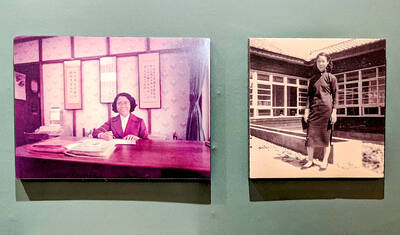“What is this?” a teacher asks a class of elementary school students. “An elephant,” some boys snicker. “They are testicles, and they are never at the same level. One is always higher than the other,” the teacher explains.
Class is dismissed, and the boys rush out the door, humming a tune using the anatomical terms they just learned.
This is the opening scene of Baseball Boys (野球孩子), a documentary about a baseball team consisting of fifth and sixth graders, mostly Aboriginal boys, from Fuyuan Elementary School (富源國小) in Hualien County.
In terms of subject matter, the film is akin to My Football Summer (奇蹟的夏天). Both follow a group of young athletes undergoing rigorous training for an upcoming national championship. But the two differ in their approach to the genre. If My Football Summer is a novel filled with dramatic moments and a narrative climax, Baseball Boys is a prose poem composed of fragments of everyday life.
Winner of the top prize at the biannual Taiwan International Documentary Festival (台灣國際紀錄片雙年展) last year, this documentary by experienced filmmakers Shen Ko-shang (沈可尚) and Liao Ching-yao (廖敬堯) dispenses with the voice-over and keeps interviews to a minimum. The pace is leisurely and the film dwells on the little things: the silly games two brothers play before bedtime, a girl smacking the back of a boy’s head because she thinks he’s cute, young baseball players turning the school’s playground into a concert hall at night.
Liao and Shen play the role of quiet observers, gazing intimately into the boys’ lives and resisting the temptation to comment. We see a father with serious burn scars on his face, a boy calling his grandmother rather than his parents after the team’s first victory, and a student dreaming of becoming either an athlete or a singer when he grows up. But the camera stops there, leaving members of the audience to formulate their own ideas using their imaginations.
Unlike many sports documentaries, with their high emotion and enthusiasm in the run-up to the big game, Baseball Boys paints a realistic portrait of a group of students on the cusp of adolescence. Because many of the young players will graduate from elementary school after the game, it is a time to bid farewell to childhood and prepare for the trials and tribulations of their teenage years.
The film ends with a new academic year after summer vacation. New faces show up on the baseball team. Boys and girls banter and practice street-dance moves as life goes on in the village.

Following the shock complete failure of all the recall votes against Chinese Nationalist Party (KMT) lawmakers on July 26, pan-blue supporters and the Chinese Communist Party (CCP) were giddy with victory. A notable exception was KMT Chairman Eric Chu (朱立倫), who knew better. At a press conference on July 29, he bowed deeply in gratitude to the voters and said the recalls were “not about which party won or lost, but were a great victory for the Taiwanese voters.” The entire recall process was a disaster for both the KMT and the Democratic Progressive Party (DPP). The only bright spot for

Aug. 11 to Aug. 17 Those who never heard of architect Hsiu Tse-lan (修澤蘭) must have seen her work — on the reverse of the NT$100 bill is the Yangmingshan Zhongshan Hall (陽明山中山樓). Then-president Chiang Kai-shek (蔣介石) reportedly hand-picked her for the job and gave her just 13 months to complete it in time for the centennial of Republic of China founder Sun Yat-sen’s birth on Nov. 12, 1966. Another landmark project is Garden City (花園新城) in New Taipei City’s Sindian District (新店) — Taiwan’s first mountainside planned community, which Hsiu initiated in 1968. She was involved in every stage, from selecting

As last month dawned, the Democratic Progressive Party (DPP) was in a good position. The recall campaigns had strong momentum, polling showed many Chinese Nationalist Party (KMT) lawmakers at risk of recall and even the KMT was bracing for losing seats while facing a tsunami of voter fraud investigations. Polling pointed to some of the recalls being a lock for victory. Though in most districts the majority was against recalling their lawmaker, among voters “definitely” planning to vote, there were double-digit margins in favor of recall in at least five districts, with three districts near or above 20 percent in

The great number of islands that make up the Penghu archipelago make it a fascinating place to come back and explore again and again. On your next trip to Penghu, why not get off the beaten path and explore a lesser-traveled outlying island? Jibei Island (吉貝嶼) in Baisha Township (白沙鄉) is a popular destination for its long white sand beach and water activities. However, three other permanently inhabited islands in the township put a unique spin on the traditional Penghu charm, making them great destinations for the curious tourist: Yuanbeiyu (員貝嶼), Niaoyu (鳥嶼) and Dacangyu (大倉嶼). YUANBEIYU Citou Wharf (岐頭碼頭) connects the mainland